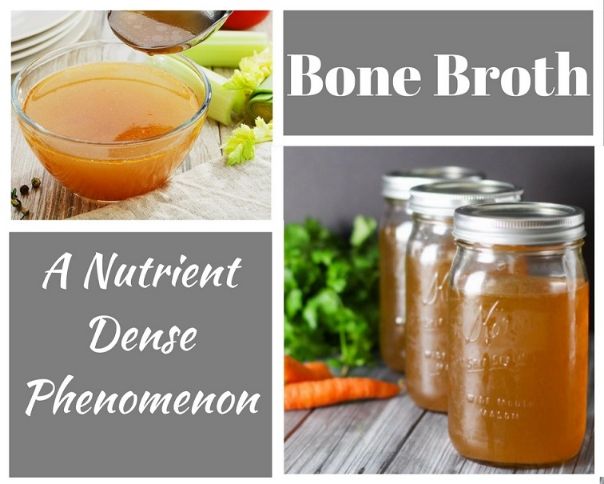
If you haven’t added bone broth to your diet, I’d encourage you to make this delicious, nutrient dense food a part of your weekly routine.
What is Bone Broth?
Bone broth is a flavorful liquid made by boiling the bones of just about any vertebrate (typically poultry, beef, pork, bison, lamb, fish) in water for an extended period of time. Often vegetables and herbs are added for flavoring. The bones from mammals need to be sawed open so that the nutrients can be released, but fowl and fish don’t. The used bones and vegetables are strained from the liquid and discarded. The resulting liquid is called “broth” or “stock” and is rich in vitamins, minerals, amino acids and antioxidants.
What is the Difference Between Stock & Broth?
Stock always involves simmering roasted bones for a long time to extract their gelatin and flavor. Broth is similar but is any liquid that has had meat cooked in it and often has vegetables and seasoning added. Stock is usually left unseasoned. In today’s kitchens, the terms are generally interchangeable.
Why is it healthy?
There is a reason why your grandmother made chicken soup when you were sick. It is because it is easy to digest and is rich in nutrients that can heal your body. When cooked for long periods of time, nutrients are released in forms that your body can easily absorb.
-
Heal leaky gut
-
Overcome food intolerance and allergies
-
Improve joint health
-
Reduce cellulite and improve skin health
-
Boost the immune system
-
Detoxification agent
Bone Broth Nutrition
Bone broth can contain over 19 easy-to-absorb, essential and non-essential amino acids (the building blocks of proteins); collagen and gelatin, which help form connective tissue; and nutrients that support digestive functions, immunity and brain health.
Here are some of the nutritional compounds in bone broth:
1. Glycosaminoglycans (GAG) - Several important GAGs are in bone broth including glucosamine, hyaluronic acid and chondroitin sulfate. Glucosamine helps maintain the cartilage in joints making them more flexible. Hyaluronic acid is found in skin, connective and neural tissues and contribute to cell proliferation and encourage our cells to function properly throughout the body. They also support skin promoting cell rejuventation and firmness. Chondroitin Sulfate is also found in the cartilage in joints and supports joint, skin and bone health.
2. Minerals and Electrolytes – Bone broth provides essential minerals, including electrolytes in a form that is easy to absorb. These include calcium, magnesium, potassium and others which all support bone density, heart and digestive health and nerve signaling.
3. Collegen and Gelatin - Collagen is the protein found in connective tissue of vertebrate animals. It’s abundant in bone, marrow, cartilage, tendons and ligaments. It helps form the connective tissue that seals and soothes the lining of gastronintestinal tract which improves nutrient absorption and keeps it from leaking. The breakdown of collagen in bone broths is what produces gelatin which is the gel-like, smooth structure that covers and holds our bones together, allowing us to move freely. Gelatin also promotes probiotic balance and growth. Collagen and gelatin make your skin soft and supple, reducing wrinkles and decreasing cellulite.
4. Amino Acids – Gelatin contains arginine, glutamine, and proline, which are only produced if your body needs to heal so adding them to your diet helps your body heal more quickly. Arginine is necessary for the production of growth hormones, immune function and wound healing. Glycine helps the body detoxify, prevents the breakdown of protein tissue, and is a neurotransmitter that improves sleep and memory. Proline helps regenerate cartilage and heal joints, helps repair leaky gut. Glutamine protects the gut lining and improves metabolism and muscle building.
5. Glutathione – Bone broth contains glutathione which plays important roles in antioxidant defense, nutrient metabolism and regulation of cellular events and immune responses.
Detoxification
Besides soothing and healing the digestive system, bone broth is considered a detoxification agent because it can help the digestive system expel waste and promotes the liver’s ability to remove toxins and improves the body’s use of antioxidants. In today’s world, we are exposed to a wide range of toxins and while the human body has mechanisms to detox itself, it can become overwhelmed with the large amount of environmental toxins, artificial ingredients and heavy metals. Several nutrients found in bone broth help with detoxification. Potassium and glycine support both cellular and liver detoxification. Sulfur (especially when you add garlic and herbs to the broth) boost detoxification. Glutathione lowers oxidative stress and helps eliminate fat-soluble compounds such as mercury and lead. Consuming bone broth also increases the intake of essential minerals, which act like chelators to remove toxins by stopping heavy metals from attaching to mineral receptor sites.
I am amazed that this one food can do so much for our bodies and know that you will want to try it! To make your own bone broth see the articles on how to make bone broth and bone broth breakfast soup or see resources on purchasing bone broth.
